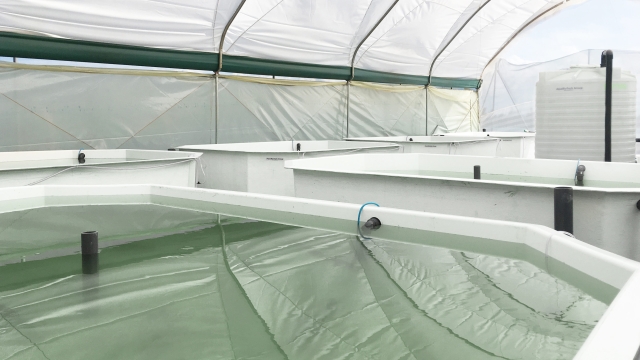
As we face the growing challenges of climate change, overfishing, and dwindling natural resources, the aquaculture industry is stepping into the spotlight as a vital solution for sustainable food production. Innovations in aquaculture technology are transforming the way we cultivate and harvest seafood, making it more efficient, environmentally friendly, and resilient to the pressures of modern demands. The Rokter stands at the forefront of this revolution, serving as an authoritative hub for insights into aquaculture technology and sustainability.
At The Rokter, aquaculture professionals can explore a wealth of in-depth blog posts and industry resources that shed light on cutting-edge practices and advancements in the field. From smart farming techniques and ecological considerations to the latest in equipment and monitoring technologies, this platform fosters a vibrant community dedicated to sharing knowledge and inspiring innovation. By connecting with peers in a dedicated forum, professionals can exchange ideas and collaborate on solutions that will shape the future of seafood production for generations to come.
Overview of Aquaculture Technology
Aquaculture technology encompasses a wide range of advancements aimed at improving the efficiency, sustainability, and productivity of fish and seafood farming. As the global demand for seafood continues to rise, innovative solutions are essential for meeting this need while minimizing environmental impact. Technologies such as recirculating aquaculture systems, integrated multi-trophic aquaculture, and automated feeding systems are some examples that are transforming the industry.
Recirculating aquaculture systems (RAS) allow for the continuous recycling of water, reducing the need for large volumes of freshwater and minimizing waste output. This method not only conserves resources but also provides a controlled environment for fish growth, leading to healthier stocks. The integration of sensors and monitoring technologies further enhances RAS by enabling real-time tracking of water quality and fish health, thus ensuring optimal conditions for production.
Sustainability is a key focus within aquaculture technology, driven by the need to address overfishing and habitat destruction. Innovations such as biofloc technology and algae-based feed are gaining traction as environmentally friendly alternatives to traditional practices. Moreover, the development of genetic improvements and disease-resistant fish varieties contribute to resilience and productivity in aquaculture operations, paving the way for a more sustainable future in seafood production.
Sustainable Practices in Aquaculture
Sustainable practices in aquaculture are essential for minimizing environmental impact while ensuring the long-term viability of fish farming. These methods focus on reducing pollution, conserving resources, and promoting biodiversity. By implementing techniques such as recirculating aquaculture systems, farmers can significantly reduce water usage and waste output. These systems recirculate water, which allows for continuous filtration and enhances water quality, leading to healthier fish and fewer diseases.
Biosecurity tools for aquaculture
Another vital aspect of sustainability in aquaculture is the selection of feed. Traditional fish feed often relies on wild-caught fish, which can deplete ocean stocks. Sustainable aquaculture practices promote the use of plant-based feeds, alternative protein sources, and by-products from other industries. By diversifying feed sources, aquaculture can reduce its dependency on fishmeal and ensure that farming operations have a lower ecological footprint. This shift not only supports aquatic ecosystems but also contributes to more resilient supply chains.
Lastly, the integration of aquaculture with other forms of agriculture, such as agroecology, presents a promising avenue for sustainability. Practices such as aquaponics combine fish farming with plant cultivation, utilizing nutrient-rich water from fish tanks to irrigate and nourish crops. This symbiotic relationship optimizes resource use and contributes to food security. By exploring these innovative approaches, aquaculture can advance towards a more sustainable future while meeting the growing global demand for seafood.
Innovative Tools and Techniques
The advancement of technology in aquaculture has led to the development of innovative tools that enhance productivity and sustainability. Automated feeding systems have become increasingly popular, allowing for precise control over feed distribution based on real-time data. This not only improves growth rates but also minimizes feed waste, ultimately leading to more sustainable farming practices. Additionally, imaging and sensing technologies are being deployed to monitor fish health and behavior, enabling early detection of diseases and better management of fish stocks.
Another significant innovation is the use of recirculating aquaculture systems (RAS), which efficiently recycle water while maintaining optimal conditions for aquatic life. RAS reduces the environmental impact typically associated with aquaculture by minimizing water usage and preventing the escape of farmed species into natural ecosystems. This system allows for year-round production in controlled environments, making it possible to farm species that would otherwise be unsustainable due to climate or geographical limitations.
Incorporating artificial intelligence and machine learning further enhances aquaculture operations. These technologies analyze vast amounts of data from various sources, such as water quality sensors and market trends, to optimize production strategies. Predictive analytics can help farmers identify the best times for harvesting or stocking, ensuring maximum efficiency. By leveraging these advanced tools and techniques, the future of aquaculture looks promising, paving the way for a more sustainable and responsible approach to ocean resource management.
Community Engagement and Resources
Community engagement is vital for the success of aquaculture technology initiatives. The Rokter provides a platform where professionals can share experiences, insights, and challenges faced in the aquaculture industry. By fostering connections among aquaculture practitioners, researchers, and enthusiasts, The Rokter encourages collaboration and innovation. This engagement not only enriches individual knowledge but also contributes to collective advancements in sustainable practices.
In addition to community interaction, The Rokter features comprehensive resources that assist professionals in navigating the complexities of the aquaculture sector. Users can access in-depth blog posts that cover the latest advancements in aquaculture technology, best practices, and case studies from the field. Whether you’re looking for new techniques to improve efficiency or insights into market trends, these resources are designed to help you stay informed and competitive.
Furthermore, The Rokter hosts a dedicated forum that serves as a space for dialogue and knowledge exchange among aquaculture professionals. Here, users can pose questions, seek advice, and discuss emerging technologies and sustainability measures. This interactive element not only enhances learning but also builds a sense of community that is essential for the growth and development of aquaculture as a whole.


